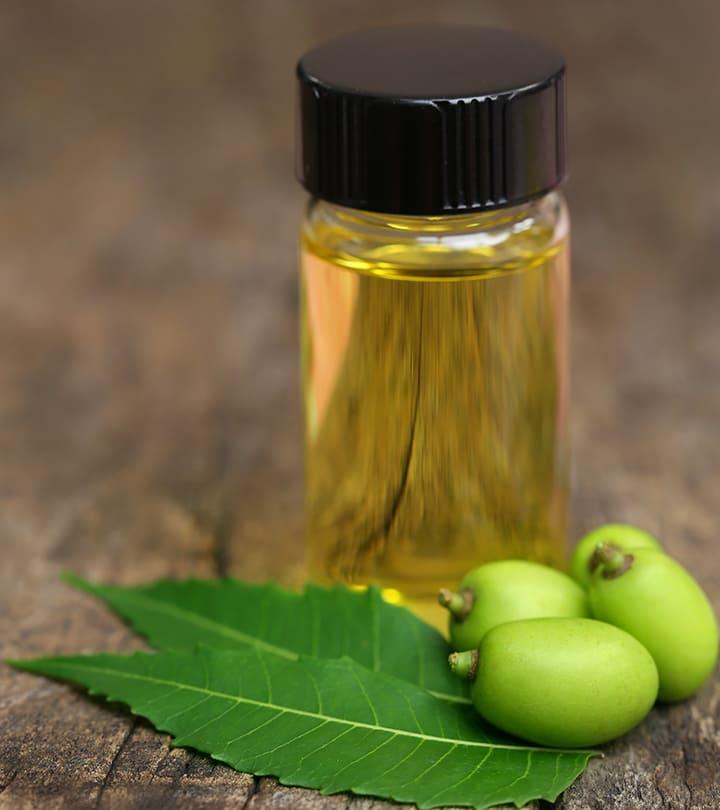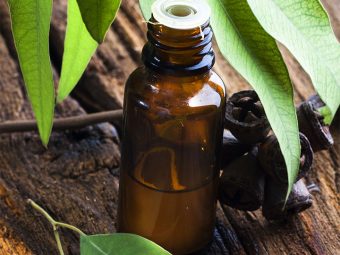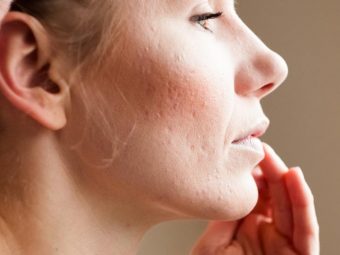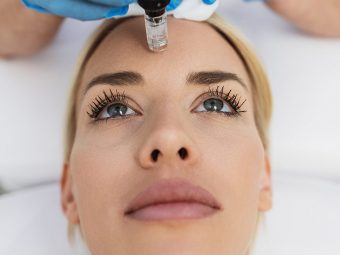Benefits Of Neem Oil For Skin, How To Use It, And Risk Factors
Say 'goodbye' to all your skincare woes with this therapeutic natural oil.

Neem oil is a popular ingredient in several products, such as anti-aging creams anti-dandruff shampoos. Since it offers many benefits, you can use neem oil for skin, body, and hair issues. It is also believed to help manage acne issues.
This bitter-tasting, brownish natural oil may improve your skin texture and fight against bacteria. But how does neem oil actually work? Is it safe to use on the skin? How do you use it?
This article will answer all your queries related to neem oil, its benefits, how to use it, safety, properties, and more. Keep reading to know everything about neem oil.
In This Article
Benefits Of Neem Oil For Skin
Be it for medicinal baths or treating dandruff, neem oil has been used in a wide range of skin and hair care remedies. Here are some of the best uses and benefits of neem oil for the skin.
1. Treats Acne
Neem seed oil has antibacterial and anti-inflammatory properties, making it a natural remedy for acne. A study showed that using neem oil for acne treatment can actually treat and prevent breakouts in the long run. Just apply neem oil as a spot treatment or all over your face at night to treat acne.
2. Reduces Skin Dryness
Well-hydrated skin is less prone to damage. Neem oil contains essential fatty acids like linoleic acid, palmitic acid, oleic acid, and stearic acid. These acids can strengthen the skin’s barrier and keep it moisturized.
3. Fights Skin Damage
Neem oil also has antioxidant properties that protect the skin from environmental damage. A study found that neem oil comprises nimbolide and azadirachtin. These components combat the skin damage caused by free radicals and can improve the overall skin texture.
4. Eliminates Fungal Infections
You can also use neem oil for treating skin fungi since it contains fungicidal compounds called gedunin and nimbidol. This Ayurvedic oil has been found to be effective for fighting typical fungal skin conditions such as athlete’s foot and ringworm.
5. Treats Eczema And Other Skin Conditions
Nimbidin, one of the primary components of the neem plant, can effectively treat eczema, dermatitis, and furunculosis. Some sources claim that it can also treat psoriasis and provide relief from boils and ulcers. That said, more research is needed to back these claims.
From the various neem oil benefits and applications for the skin, it is clear that adding this Ayurvedic oil to your skin care regimen is a good idea. However, neem oil needs to be used safely and in the correct manner. Otherwise, you may end up doing more harm to your skin than good. Read on to learn how to apply neem oil to your skin.
How To Use Neem Oil On Your Skin
Neem oil must be applied only after you have carried out a small patch test on your arm to check how your skin reacts to it. Apply a small amount on the inside of your forearm. If you do not experience any adverse reaction like redness or irritation in 24 hours, it is considered safe for skin application.
It must be noted that neem oil in itself is a very potent essential oil. It is best used by mixing it in equal parts with a carrier oil like coconut, jojoba, or olive oil.
Adding it to a carrier oil will also give you the added advantage of a slightly subdued neem oil smell that many people find repulsive. You can also add a few drops of other pleasant-smelling oils like lavender, rose, jasmine, etc., for a relaxing and soothing effect.
If you have oily skin that gets irritated by skin oils, mix a few drops of neem oil with natural aloe vera gel for a less oily effect.
Once you have mixed it with a carrier oil or gel, follow these steps to use neem oil on your face and body:
- Soak a cotton ball or pad in a few drops of diluted neem oil.
- Apply the oil to the desired area in a light dabbing motion. Do not rub it rigorously.
- Allow it to get absorbed by your skin for about 20 minutes.
- Wash the neem oil off with warm water.
- Do this every day for the best results.
While there are many benefits of neem seed oil for the skin and hair, you must also be aware of the risks associated with it. Keep reading to find out more.
Risks Of Neem Oil For Skin
Here are the risks associated with neem oil that you must keep in mind before application:
- Neem oil is toxic and must never be consumed. Oral consumption of excessive neem oil can lead to toxicity and poisoning with symptoms like vomiting, seizures, excessive acid in the body, and brain malfunction.
- Neem oil is a very potent oil that can cause unwanted reactions in people with sensitive skin, including itchiness, redness, rash, or hives. If you notice any of these signs, stop using it immediately and consult a doctor.
- Neem oil is not suitable for children due to its high potency. It can also cause severe reactions in infants like toxic encephalopathy. Thus, it should not be used on a child unless prescribed by a doctor.
- It is also uncertain if neem oil is safe for pregnant and breastfeeding women since not many studies have been conducted in this regard. Always consult your doctor before applying it to your face or body.
Since it can cause some dangerous side effects, it is always recommended to talk to your healthcare provider before using it to avoid any health risks.
As the popularity of neem oil has grown, many skin care enthusiasts are interested to learn whether it can be used at night. Continue reading to find out if this natural oil deserves a spot in your nighttime routine.
Can You Apply Neem Oil On Your Face At Night?
Yes, you can use neem oil on your face at night. Here’s how:
- Make a diluted mixture of cold-pressed neem oil along with a carrier oil like sesame oil, olive oil, or coconut oil.
- Apply it gently on your clean face using a cotton ball.
- Massage your face gently in an upward motion.
- Leave it on for about 20-30 minutes.
- Rinse it off with water or use a gentle cleanser.
Be careful not to leave this oil overnight on your face. Use pure neem oil for the face regularly for clearer skin.
Neem oil can help you get rid of acne and improve your skin. For clearer skin, apply pure neem oil to your face on a regular basis. It is best to combine it with a carrier oil like coconut, jojoba, or olive oil in equal amounts. Neem oil is easy to use and may be purchased at your local drugstore. However, as previously indicated, it may cause an adverse reaction in those with sensitive skin. So, if you are going to use this Ayurvedic skin care product, be careful. Nevertheless, you may reap the benefits of neem oil and obtain beautiful skin without using harsh chemicals if you exercise caution.
Frequently Asked Questions
Does neem oil help dark circles?
Yes, neem oil may possess anti-tanning properties that may help reduce pigmentation around the eyes (9), (10).
How long does neem oil take to work?
It may take between a few days to a few weeks before you see any results. Conduct a patch test to check for adverse effects before using it.
Key Takeaways
- Neem oil is a bitter-tasting natural oil with many therapeutic uses. It has anti-inflammatory and antibacterial properties that help benefit skin health.
- This brownish oil can help treat acne, reduce skin dryness, and fights skin damage.
- You can apply this oil to your skin after diluting it with any carrier oil.
References:
Articles on StyleCraze are backed by verified information from peer-reviewed and academic research papers, reputed organizations, research institutions, and medical associations to ensure accuracy and relevance. Read our editorial policy to learn more.
- Topical Herbal Therapies an Alternative and Complementary Choice to Combat Acne
https://www.researchgate.net/profile/Prof-Swarnlata-Saraf/publication/270950972_Topical_Herbal_Therapies_an_Alternative_and_Complementary_Choice_to_Combat_Acne/links/5988854aaca27266ada4a0f2/Topical-Herbal-Therapies-an-Alternative-and-Complementary-Choice-to-Combat-Acne.pdf - Formulation and characterization of solid lipid nanoparticles loaded Neem oil for topical treatment of acne
https://www.sciencedirect.com/science/article/pii/S2221618913601444?via%3Dihub - Variations in fatty acid composition of neem seeds collected from the Rajasthan state of India
https://pubmed.ncbi.nlm.nih.gov/11171243/ - Therapeutics Role of Azadirachta indica (Neem) and Their Active Constituents in Diseases Prevention and Treatment
https://www.hindawi.com/journals/ecam/2016/7382506/ - Herbal Remedies of Azadirachta indica and its Medicinal Application
https://www.jocpr.com/articles/herbal-remedies-of-azadirachta-indica-and-its-medicinal-application.pdf - Medicinal and Cosmetic Potential of Neem (Azadiracta Indica) Seed Oil: A Review
https://www.rroij.com/open-access/medicinal-and-cosmetic-potential-of-neem-azadiracta-indica-seed-oil-a-review.php?aid=34057 - Neem oil poisoning: Case report of an adult with toxic encephalopathy
https://pubmed.ncbi.nlm.nih.gov/24339648/ - Neem Oil Poisoning as a Cause of Toxic Encephalopathy in an Infant
https://link.springer.com/article/10.1007/s12098-013-1327-x - Azadirachta indica (Neem) as a Potential Natural Active for Dermocosmetic and Topical Products: A Narrative Review
https://www.researchgate.net/publication/361046892_Azadirachta_indica_Neem_as_a_Potential_Natural_Active_for_Dermocosmetic_and_Topical_Products_A_Narrative_Review - FORMULATION AND EVALUATION OF HERBAL UNDER EYE DERMA GEL
http://www.recentscientific.com/sites/default/files/18667-B-2021.pdf













